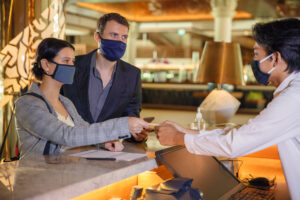Whether you’re a hotel chain, cruise line, or theme park, 2020 was a challenging year, and you’re no doubt eager for the return of “normal” guest experiences, occupancy levels, and, of course, revenue streams. But what was normal in 2019 will likely never be quite the same for the industry and its customers, and that’s not just because of the emphasis the pandemic has placed on guest safety and health protocols.
As companies seek to safely enable tourism while minimizing exposure in a pandemic-transformed world, the industry’s digital future has become a reality faster than anyone could have predicted. Indeed, many businesses used the downtime and uncertainty brought on by the pandemic to double down on their investments in digital.
While digital transformation has no doubt been challenging for your business, it promises to pay dividends from a customer experience and revenue perspective. Keep reading to explore five total trends leading travel & hospitality brands should capitalize on — three trends to improve the customer experience, and two to enable a safe return to work and play.
Trends to follow to improve the guest experience & increase revenue
With 2020 revenue down an estimated 55%, the travel industry is expected to book a CAGR of just 3.5% from 2017 to 2025, according to Statista. Because of this pandemic-driven contraction in 2020, the market will likely not surpass 2019 revenue levels until 2023. Even the best performing segment from 2019 to 2020 — the global amusement park industry — faced an estimated decline of 2.6% from $73.5B to $71.6B, respectively.
Whatever your travel & hospitality industry segment, you can follow these digital trends to improve the guest experience and maximize revenue in 2021 and onward:
Omnichannel phygital customer experience
In e-commerce, the omnichannel customer experience has become the law of the land, with one report showing that businesses with an omnichannel strategy retain up to 89% of their customers, while those who don’t retain only 33%.
In travel & hospitality, omnichannel refers to cultivating a branded user experience with a similar look & feel across the entire customer journey, from research and inspiration on social media to booking to the in-person experience itself. For brands looking to increase customer engagement before and after a trip, an important trend is offering mixed reality experiences that capture the magic of actually being there, but from the comfort of one’s own home.
During the trip, physical touchpoints like check-in, checkout, interactions with customer service, and payments are equally important. According to Eric Merz, Client Partner at Wizeline, connecting these channels to digital is critical. “Taking the friction out of travel, and allowing more time to enjoy the experience, has to be the goal. The technology shouldn’t call attention to itself. It is there to serve and enhance quickly, effectively, and accurately, then disappear until it is needed again.”
AI personalization based on customer segmentation
84% of customers feel the experience a company provides holds the same level of importance as the quality of its products and services, and in today’s digital age, that experience must be personalized to be impactful.
Artificial intelligence (AI) technologies have a dramatic impact on all things CRM, from employee productivity to campaign personalization and, in turn, conversion rates. On the front-end, the customer benefits from the right offer at the right time in the right channel, while the company benefits from this happening automatically — assuming the right rules are in place.
To enable personalization at scale, companies are undergoing massive data hygiene projects focused on governance and customer segmentation to ensure CRM databases are optimized to support the rollout of personalized marketing campaigns.
Cloud migration & cutting technical debt
In addition to making investments in improving the customer experience, migrating existing technologies — everything from on-premises databases to monolithic legacy applications — to the cloud should be top of mind. By following a hybrid cloud approach that blends public and private cloud infrastructure with on-premises technologies, companies can increase business agility through improved interoperability, scalability, and security.
While many apps are ripe for cloud migration, some may be better off dead — literally. In CIO’s article “7 signs it’s time to kill an IT investment,” Anibal Abarca, CTO at Wizeline, says, “One red flag that it may be time to discontinue or minimize a particular IT investment would be if it isn’t enabling one of three key areas: improving customer experience, developing products faster, and maximizing reliability and security.”
Trends to follow for a safe return to work & play
While maximizing revenue and optimizing the customer experience remain top of mind under any circumstances, guest and employee safety is more important than ever. Here’s our thinking on how you can ensure your guests’ and crew members’ safety while also generating business value.
Keeping shared spaces safe & optimized for guests
As more and more hotels, restaurants, cruise lines, and theme parks resume full operations over the coming year, nothing is more important than guest safety. One technology that can help mitigate risk and improve the ability to keep shared spaces safe is people-counting sensors, which provide automatic insight into how many people are using a space and for how long while maintaining guest privacy, as there are no cameras involved.
In the short-to-medium-term, businesses will have to follow strict occupancy guidelines. For hotels, cruise lines, and other operators with numerous shared indoor spaces, Safe by Density can help increase safety by automatically sending alerts when places such as lobbies, fitness areas, restaurants, and conference rooms reach unsafe occupancy levels.
In the longer term, deploying this technology will help improve overall operations. For example, Density helped Marriott leverage real-time data generated by sensors to take the guesswork out of hotel foot traffic in amenities spaces. With exact data on usage, Marriott has been able to optimize which resources it deploys and at what time, whether it’s the number of staff serving customers at the front desk or how many treadmills are available in the fitness room.
Optimizing crew operations with technology platforms
Crew planning is one of the most challenging tasks in the hospitality industry. Until recently, crew management in most companies, primarily airlines, was manually accomplished, with only pen and paper. Because of the problem’s complexity, it usually took a team of six to eight planners several weeks to map out crew pairing for a large airline.
Companies can save time and money by building a smart, technology-enabled crew management system that, using AI and requiring minimal human oversight, automates staff allocation and adjustment based on demand, capacity, and safety requirements. Through machine learning, the system will get better with time to become more refined and provide additional value.
What’s next?
Digital transformation is an ongoing process, and it can be extra tricky to get right in an industry where a major component of the customer experience will always be in-person. By seamlessly blending digital and physical channels to create an omnichannel experience, increasing business agility through investments in cloud and AI, and always keeping employee and guest safety top of mind, your business will have a much better chance of getting it right.
If you’re pursuing any or all of these trends in 2021, consider partnering with a technology services provider like Wizeline to help lighten the load. Contact consulting@wizeline.com to start the conversation today!







